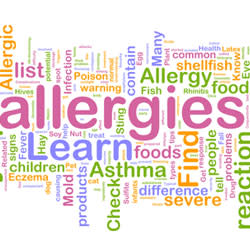Food allergy or food intolerance – what’s the difference?

© Thinkstock
With Allergy UK estimating that up to 45% of British people suffer from food intolerances, inviting friends over for dinner or eating out is no longer simply a question of ‘shall we have fish or meat?’ It can often require a lot more forward planning. Added to this, between one and two in every 100 people in the UK have a genuine food allergy, which poses even more potential risks.
So what are the major differences between these two dietary disorders and how can you find out which one you're suffering from?
Recognising the signs of intolerances and allergies
There are several key differences between allergies and food intolerances. Food allergies produce acute and distinct symptoms, usually within seconds or minutes of consuming an allergen and in extreme cases it can be life threatening. A reaction isn’t dependent on a minimum amount of a food being eaten – even small traces of the problem food can trigger a reaction.
With food intolerances normally a reasonable portion of food is needed to cause a reaction, although some people are sensitive to small amounts. Food intolerances are difficult to diagnose and usually the patient is required to keep a food diary or try an exclusion diet to figure out the trigger.
Unlike a food allergy, a person’s tolerance to a food can fluctuate from day to day or week to week and so intolerances are typically very difficult to test for accurately. You may find, as time goes on, that you grow out of a food intolerance that you once had as a child.
More commonly however people find that they develop food intolerances once they hit adolescence, or in early adulthood – for example this is typical in the case of lactose intolerance.
With a suspected food allergy an expert can diagnose the food through several tests along with taking your medical history.
Symptoms of a food allergy
There are a number of common causes of food allergy in the UK such as fish and shellfish, peanuts, tree nuts (e.g. walnuts) and eggs. These foods may trigger the following symptoms:
Itchy or swollen lips, mouth, tongue and throat
Skin reactions (e.g. swelling and itching, a rash around your mouth, eczema and flushing)
Wheezing or shortness of breath
Diarrhoea, feeling sick, vomiting and bloating
Coughing
Sore or red, itchy eyes
Read more on Food allergies
Symptoms of a food intolerance
Foods that commonly cause intolerances, such as in the case of Irritable Bowel Syndrome, are wheat, rye, barley, dairy products, caffeine rich products and eggs but an individual could show sensitivity to varying degree towards almost any food. The following symptoms may be experienced:
Nausea
Bloating and wind
Abdominal pain and distension
Diarrhoea and/or constipation
Flushing of the skin
Read more on Food intolerances
Testing for intolerance and allergy
Food allergy tests: If you suspect an allergy, the first port of call is your GP. As food allergy symptoms appear more severely and are more serious than food intolerances, a test should always be carried out by a trained medical professional. Tests for allergies are usually more invasive than those for food intolerances. However, results are usually very quick and accurate. Tests that your doctor may advise include: skin prick test, blood test - a specific IgE test (formally known as the RAST test), and the patch test.
Food intolerance tests: Whilst not giving results as accurately as allergy tests, there are also many ways to test for food intolerance. Most methods are non-invasive and are carried out over a period of time. Tests that may be done at a GP surgery or private clinic include: the Bio-Energetics Resonance (BER) testing method, food exclusion diet as well as other specific commercial tests.
For more comprehensive information on each particular intolerance or allergy, read our Allergies and Intolerances dossier.
For particular information about dietary constraints and guidelines, follow the links below...
Aimee Matthews
More information:
Treating food allergies and intolerances
Worldwide rise in food allergies
Nutrition discussions


